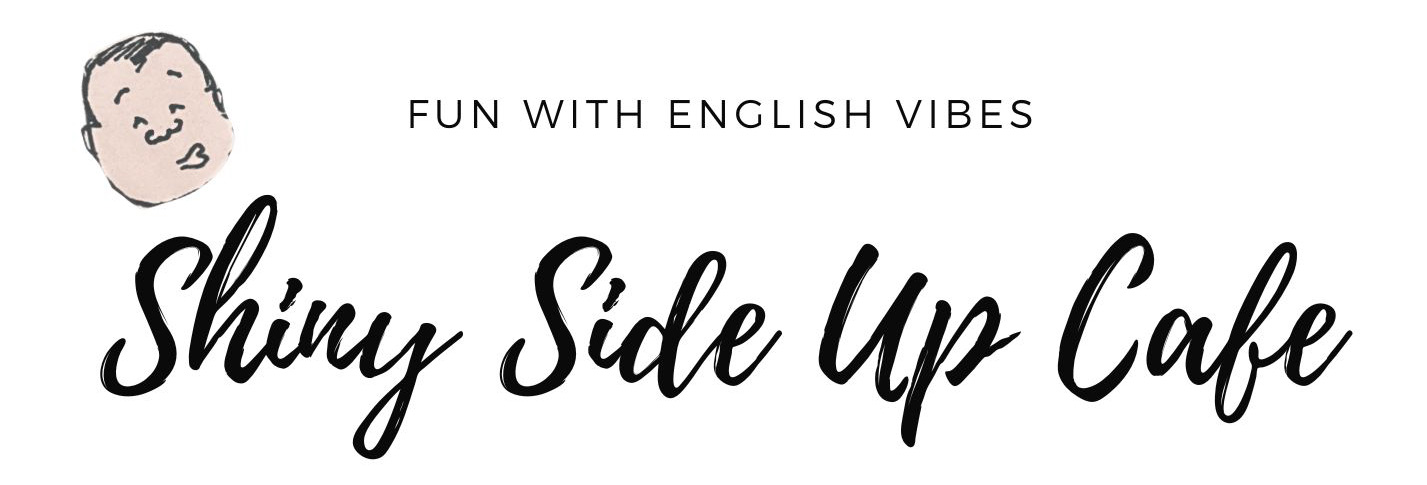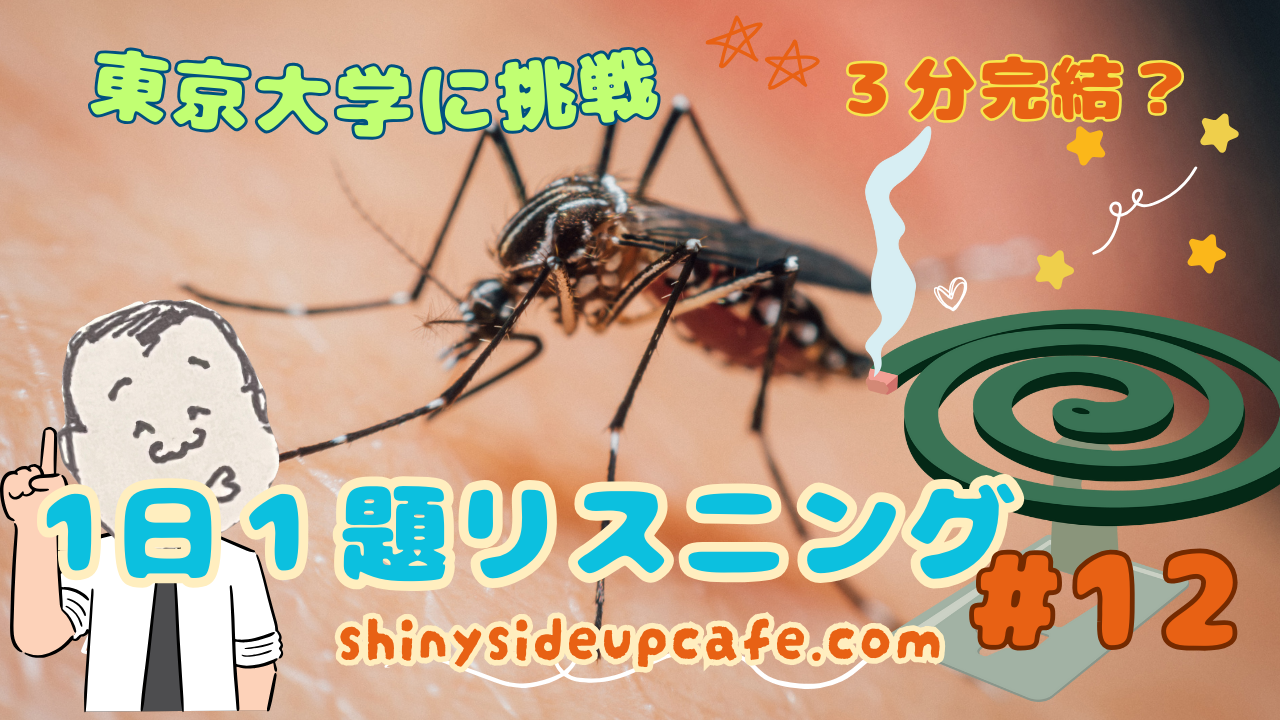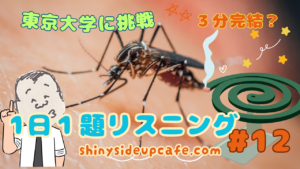Created By ondoku3.com
東大のリスニング問題です。東大や東京外国語大のリスニングは、英検とはちがい、問題用紙をみながら推測して考え解答すべきものなので、英検1級でも取り上げ得られていた『蚊』に関する東大の問題をここで取り上げるので、英検1級との難易度の付け方の違いを感じて欲しいと思います。
東京大学のリスニング問題に挑戦
問いに対して、最も適切な答えを以下の選択肢から選び、記号答えなさい。
(1) What does the speaker say about mosquitoes biting people?
- a) 20% of people are rarely or never bitten.
- b) 20% of people are bitten more often than others.
- c) 20% of people are not protected from bites by insect spray.
- d) Scientists have discovered a new treatment for bites that works for 20% of people.
(2) Which of the following does the speaker not say?
- a) Mosquitoes bite people in order to get proteins from them.
- b) Most people release a chemical indicating their blood type.
- c) 15% of mosquitoes are unable to distinguish a person’s blood type.
- d) People with Type B blood are bitten by mosquitoes more often than people with Type A blood.
(3) According to the speaker, what is one reason why children are bitten less than adults?
- a) Children move around more than adults.
- b) Children have smoother skin than adults.
- c) Children breathe out less CO2 than adults.
- d) Children notice mosquitoes on their skin more than adults.
(4) According to the speaker, why do people tend to get bitten on their ankles and feet?
- a) Because those parts of the body tend to be exposed.
- b) Because those parts of the body tend to sweat more.
- c) Because those parts of the body have a lot of bacteria.
- d) Because those parts of the body are not as sensitive to the touch.
(5) What is the “good news”?
- a) It might be possible to modify mosquito genes so they do not bite people.
- b) It might be possible to modify human genes to keep mosquitoes away naturally.
- c) Natural blood proteins might be utilized to make people resistant to mosquito bites.
- d) Chemicals naturally produced by mosquito-resistant people might be utilized to make more effective sprays.
解説:なぜまちがえたのか?
(1) What does the speaker say about mosquitoes biting people?
第2段第2文にIt turns out that an estimated 20% of people are especially delicious to mosquitoes, and regularly get bitten more often than others.「推定20パーセントの人は…他の人よりもよく蚊に刺される」とある。2. 20% of people are bitten more often than others.の「20パーセントの人は他の人よりよく刺される」が正解。
(2) Which of the following does the speaker not say?
第3段第2~5文には「蚊は私たちの血液からたんばく質を得るために刺す…ある研究では…蚊が0型の人に,A型の人の2倍近くたかることがわかった。B型の人はその中聞くらいだった。…約85パーセントの人は,自分がどの血液型かを示す化学的な信号を皮膚から発し,15パーセントは発していない」とある。C)の「蚊の15パーセントは人の血液型を識別できない」に当たる事柄は述べられていない。これが正解。
(3) According to the speaker, what is one reason why children are bitten less than adults?
第4投第1文に「蚊が目標の居場所を特定するカギとなる方法の一つは,呼気に放出されている二酸化炭素をかぎつけることである」とある。この前提から,第3・4文で「より多くの息を吐く人(=体がより大きい人)は他の人よりも蚊を引き寄せやすい。これが,子どものほうが一般的に大人よりも刺されにくい理由の一つである」としている。C)の「子どもは大人より吐き出す二酸化炭素の量が少ない」が正解。
(4) According to the speaker, why do people tend to get bitten on their ankles and feet?
第5段第1文に「人間の皮膚にもともと生息するバクテリアも,蚊を引き寄せることに影響する」,同段最終文に「足首や足には,もともと相当なバクテリアのコロニーがある」とある。C)の「体のそれらの部分には,多くのバクテリアがいるから」が正解。
(5) What is the “good news”?
最終段第3~最終文に「良い知らせもある。ほとんど蚊を引き寄せず,ほぼ刺されない人もおり…こうした人が発している化学物質が特定された。この発見は…蚊を寄せつけなくする,進歩した虫よけスプレーにつながるかもしれない」とある。d)の「蚊に抵抗力のある人たちが自然に作り出している化学物質が,もっと効果的なスプレーを作るのに活用されるかもしれない」が正解。
スクリプト
You come in from a summer hike covered with red mosquito bites, only to have your friends say that they haven’t been bitten at all. Or you wake up from a night of camping to find your ankles and wrists burning with bites, while other people are untouched.
You’re not alone. It turns out that an estimated 20% of people are especially delicious to mosquitoes, and regularly get bitten more often than others. And while scientists don’t yet have a treatment for the condition, other than insect spray, they do have a number of ideas about why some of us are bitten more often than others.
One factor that could play a role is blood type. This would not be surprising since, after all, mosquitoes bite us to take proteins from our blood, and research shows that they find certain blood types more appetizing than others. One study found that in a controlled setting, mosquitoes landed on people with Type O blood nearly twice as often as those with Type A. People with Type B blood fell somewhere in the middle. Additionally, based on their genes, about 85% of people release a chemical signal through their skin that indicates which blood type they have, while 15% do not. And mosquitoes are more attracted to people who release that chemical regardless of which type they are.
One of the key ways mosquitoes locate their targets is by smelling the CO2 emitted in their breath. They can detect CO2 from as far as 50 meters away. As a result, people who simply breathe out more air, generally, larger people, have been shown to attract more mosquitoes than others. This is one of the reasons why children generally get bitten less than adults.
Other research has suggested that the bacteria that naturally live on human skin also affect our attractiveness to mosquitoes. In a 2011 study, scientists found that having large amounts of bacteria made skin more appealing to mosquitoes. This might explain why mosquitoes are especially likely to bite our ankles and feet, which naturally have significant bacteria colonies.
As a whole, underlying genetic variation is estimated to account for 85% of the differences between people in their attractiveness to mosquitoes, regardless of whether it’s expressed through blood type or other factors. Unfortunately, we don’t yet have a way of modifying these genes. But there is good news: some people rarely attract mosquitoes and are almost never bitten. A group of scientists in the UK have identified some chemicals emitted by these people. This discovery may lead to advanced insect sprays that can keep mosquitoes away from all of us, even the delicious 20%.
解答
(l)-2 (2)-3 (3)-3 (4)-3 (5)- 4



コメント